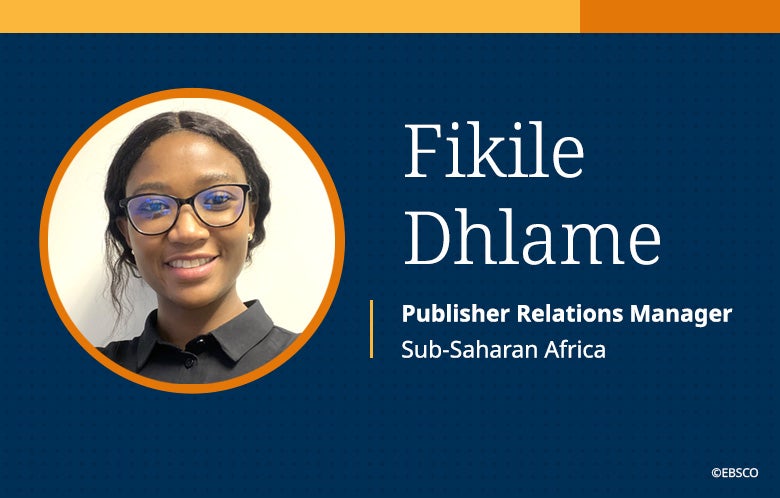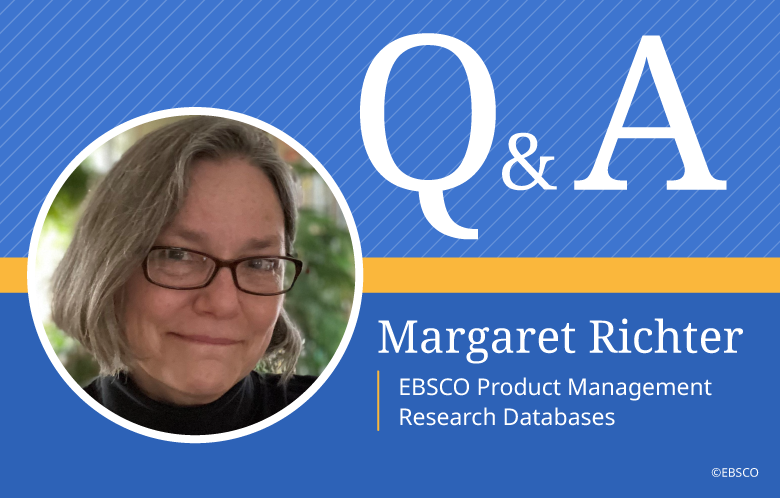Sub-Saharan Africa has a rich and diverse academic landscape, with researchers and institutions contributing valuable scholarship across fields such as health, history, economics, and cultural studies to name a few. As global interest in African perspectives continues to grow, there is increasing demand for resources that deliver high-quality, regionally relevant research.
Africa Studies Source, a new full-text database from EBSCO, is positioned to support learning, teaching, and research across the continent and beyond.
Colleen Mills (CM), Sales Vice President for Sub-Saharan Africa at EBSCO, and Peggy Flanagan (PF), EBSCO’s Senior Product Manager overseeing the development of Africa Studies Source, share their insights into how this new database was conceived and built. They discuss the careful selection process behind the content, the emphasis on African-authored publications, and the tools that help researchers and educators discover and use materials more effectively.
How does Africa Studies Source distinguish itself from other academic databases available to African institutions and researchers?
CM: The world of academic research has very few resources made specifically for the people in Africa. This database shows EBSCO’s commitment to providing resources based on global needs and gives focus to research for the people of Africa.
PF: Africa Studies Source has an impressive collection of active, curated journal publications covering the Sub-Saharan continent, written by the most respected, expert researchers in the region. It also uniquely provides academic researchers with the many important advantages of EBSCO’s high-quality metadata, powerful search engine and discoverability functionalities.
This database shows EBSCO’s commitment to providing resources based on global needs and gives focus to research for the people of Africa.
This database shows EBSCO’s commitment to providing resources based on global needs and gives focus to research for the people of Africa.
Could you elaborate on how the emphasis on African-authored and regionally sourced content enhances its value for users across Sub-Saharan Africa?
PF: Academics in the region have consistently expressed a demand for greater access to content written in and about Sub-Saharan Africa. Through our development of this database, we are addressing that need. We have included journals published in countries from Angola to Zimbabwe, and from foreign countries, that cover the most relevant topics for researchers in and about the region.
What processes were involved in curating the content for Africa Studies Source to ensure both academic rigor and regional relevance?
PF: EBSCO’s content curation process is a rigorous, multi-layered approach that draws on years of experience developing academically robust and globally relevant research databases. For Africa Studies Source, this methodology was applied with particular care to ensure the database not only meets high scholarly standards but also authentically represents the richness and diversity of the African continent.
The process is built on cross-functional collaboration among EBSCO’s product management, publisher relations, and business analyst teams, all of whom bring domain-specific expertise and a deep understanding of content trends and gaps in African Studies.
What criteria guided the selection of publications and contributors?
PF: To ensure academic rigor, the team prioritized peer-reviewed journals and selection criteria focused on source credibility, institutional affiliation, editorial oversight, citation impact, and relevance to key disciplines within African Studies—such as anthropology, sociology, economics, and postcolonial studies.
At the same time, to ensure regional relevance and representation, the curation team sought out publications not only from global academic publishers but also from African publishers, university presses, NGOs, and cultural institutions. This was essential to capturing local scholarship and underrepresented perspectives that are often missing from traditional Western databases. Emphasis was placed on including multiple languages, especially French, Portuguese, and indigenous African languages, to reflect linguistic diversity and reach researchers across regions.
Can you provide insights into the range of subjects covered within the database in addition to contemporary African research?
PF: The database covers a broad range of subjects that will benefit researchers in all areas of scholarship and research in Sub-Saharan Africa in addition to those abroad doing research about the subcontinent. Of particular interest will be the large number of journals in the areas of African studies, business and economic development, health and medicine, history, politics and government, and science and technology.
In what ways do you envision Africa Studies Source supporting librarians and educators in Sub-Saharan Africa in their engagement with students and researchers?
PF: This database responds to significant demand throughout Sub-Saharan Africa for more content published in Africa or about Africa. Africa Studies Source meets this demand with high-quality, curated content with the advantage of EBSCO’s powerful interface, EBSCOhost, and proprietary search capabilities.
CM: African libraries and students will easily be able to search across all the content in this database to find the information they need. There will be a starting point for their research, possibly for the first time.
How does the database facilitate discoverability and integration into teaching and research workflows?
PF: Africa Studies Source is built on EBSCOhost and available through EBSCO Discovery Service (EDS). The database therefore benefits from robust metadata, advanced search functionality, and compatibility with widely used library systems and research tools.
To facilitate discoverability, all content is indexed with deep metadata, including subject headings, author affiliations, geographic tags, and abstracts, making it easier for users to locate relevant materials across disciplines. The platform supports both basic and advanced search strategies, including Boolean, proximity, and field-specific queries, allowing faculty and students to refine results and uncover connections across topics in African Studies.
In terms of integration into teaching workflows, instructors can easily incorporate articles, case studies, and primary sources into course syllabi via durable links and LMS integration (such as with Canvas or Blackboard). This enables faculty to align scholarly content directly with their learning objectives while ensuring that students have persistent access to full-text materials.
For research workflows, Africa Studies Source supports features such as citation export to tools like Zotero, EndNote, and RefWorks, and persistent personal folders for saving and organizing research. The database also integrates with authentication systems (like OpenAthens and Shibboleth) and discovery services, allowing users to access content seamlessly whether on campus or remotely.
How does this diversity contribute to the comprehensiveness of the database?
PF: By incorporating research from both large and small institutions in countries across the sub-continent—and from international contributors—in addition to the many subject areas covered, we can present the most comprehensive coverage of issues and new developments in the region.
CM: We have included titles that are published in many African countries and a variety of titles published about Africa from elsewhere in the world. This range of different perspectives automatically creates diversity, which was one of our goals.
By incorporating research from both large and small institutions in countries across the sub-continent—and from international contributors—in addition to the many subject areas covered, we can present the most comprehensive coverage of issues and new developments in the region
By incorporating research from both large and small institutions in countries across the sub-continent—and from international contributors—in addition to the many subject areas covered, we can present the most comprehensive coverage of issues and new developments in the region
What strategies are in place to ensure that Africa Studies Source remains current and continues to include emerging scholarship from the continent?
PF: In addition to our careful and ongoing curation of journals for this and other EBSCO databases, we continually seek out additional high-quality academic research for Africa Studies Source. We have a team of specialists in Africa and other regions who review the literature and make recommendations to product managers, who carefully screen publications for quality. We are also open to suggestions from academics in the various fields covered by this database.
CM: Africa Studies Source is packed with essential information and as we license more content, this product will continue to grow.
---
Designed to serve both researchers within Africa and scholars worldwide, Africa Studies Source helps address local and global needs by offering a curated, multidisciplinary collection of peer-reviewed journals and other scholarly resources focused on Sub-Saharan Africa. The database aims to highlight African perspectives, expand access to authoritative research, and facilitate the integration of African studies into global academic discourse.



